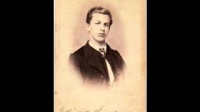Vocal Sheet Music
 "Music is the vernacular of the human soul." Geoffrey Latham
"Music is the vernacular of the human soul." Geoffrey Latham
Manhattan-Kaboul
"Manhattan-Kaboul" is a French song written by Renaud and composed by Jean-Pierre Bucolo, sung by Renaud in duo with Axelle Red, from the album Boucan d'enfer (2002). It was written in the aftermath of the incidents of September 11, 2001 and the War in Afghanistan. The song was very successful in France and Belgium, becoming a top five hit in these countries. As of August 2014, it is the 67th best-selling single of the 21st century in France, with 355,000 units sold.
Randy Newman
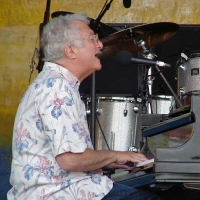
Randall Stuart “Randy” Newman (born November 28, 1943) is an American singer/songwriter, arranger, composer, and pianist who is notable for his mordant (and often satirical) pop songs and for his many film scores.
Newman is noted for his practice of writing lyrics from the perspective of a character far removed from Newman's own biography. For example, the 1972 song "Sail Away" is written as a slave trader's sales pitch to attract slaves, while the narrator of "Political Science" is a U.S. nationalist who complains of worldwide ingratitude toward America and proposes a brutally ironic final solution. One of his biggest hits, "Short People" was written from the perspective of "a lunatic" who hates short people. Since the 1980s, Newman has worked mostly as a film composer. His film scores include Ragtime, Awakenings, The Natural, Leatherheads, James and the Giant Peach, Meet the Parents and Seabiscuit. He has scored five Disney-Pixar films: Toy Story, A Bug's Life, Toy Story 2, Monsters, Inc. and Cars. Most recently he scored Princess and the Frog and is set to return for Toy Story 3 and Cars 2.
He has been singled out for a number of awards by his colleagues, including an Academy Award, two Emmy Awards, four Grammy Awards, and the Governor's Award from the Recording Academy. Randy Newman was inducted into the Songwriters Hall of Fame in 2002. In 2007, Newman was inducted as a Disney Legend.
Newman is noted for his practice of writing lyrics from the perspective of a character far removed from Newman's own biography. For example, the 1972 song "Sail Away" is written as a slave trader's sales pitch to attract slaves, while the narrator of "Political Science" is a U.S. nationalist who complains of worldwide ingratitude toward America and proposes a brutally ironic final solution. One of his biggest hits, "Short People" was written from the perspective of "a lunatic" who hates short people. Since the 1980s, Newman has worked mostly as a film composer. His film scores include Ragtime, Awakenings, The Natural, Leatherheads, James and the Giant Peach, Meet the Parents and Seabiscuit. He has scored five Disney-Pixar films: Toy Story, A Bug's Life, Toy Story 2, Monsters, Inc. and Cars. Most recently he scored Princess and the Frog and is set to return for Toy Story 3 and Cars 2.
He has been singled out for a number of awards by his colleagues, including an Academy Award, two Emmy Awards, four Grammy Awards, and the Governor's Award from the Recording Academy. Randy Newman was inducted into the Songwriters Hall of Fame in 2002. In 2007, Newman was inducted as a Disney Legend.
Hangad

Hangád (Tagalog: "yearning" or "desire") is an inspirational vocal ensemble known for songs like Pananatili and Panunumpâ (covered by pop singer Carol Banawa). They have also recorded albums which are co-produced with the Jesuit Music Ministry (JMM), the musical arm of Jesuit Communications Foundation (JesCom) of the Philippine Province of the Society of Jesus.].
In 2006, Hangad won an Awit Award for Best Inspirational or Religious Song.
In 2006, Hangad won an Awit Award for Best Inspirational or Religious Song.
Antioch Music

Antioch Music is a collective of worship leaders and musicians who serve Antioch Community Church in Waco, TX and its worldwide movement. Featuring a team led by worship pastor James Mark Gulley, the music of Antioch Music is characterized by raw, passionate worship that leads people to powerfully encounter Jesus. Our church has been producing live worship albums for more than 15 years with a handful of original songs included on most records. In 2012, Antioch Music was formed and our first all-original worship album was released, Forever Sound. Since then, we have released seven full-length albums: Our God Comes, It Is Finished, First Love, When You Call, History’s Anthem, Unchanging and most recently Live at World Mandate. Be sure to check out Antioch Music on iTunes, Spotify and YouTube.
Jimmy Van Heusen
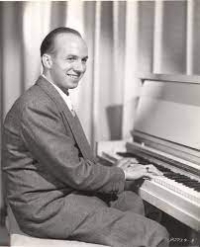
James Van Heusen (born Edward Chester Babcock; January 26, 1913 – February 6, 1990) was an American composer. He wrote songs for films, television and theater, and won an Emmy and four Academy Awards for Best Original Song.Born in Syracuse, New York, Van Heusen began writing music while at high school. He renamed himself at age 16, after the shirt makers Phillips-Van Heusen, to use as his on-air name during local shows. His close friends called him "Chet". Jimmy was raised Methodist.
Natasha Bedingfield

Natasha Anne Bedingfield (26 November 1981) is an English pop singer and songwriter.
Based in Book St., London, Bedingfield debuted in the 1990s as a member of the Christian dance/electronic group The DNA Algorithm with her siblings Daniel Bedingfield and Nikola Rachelle. Throughout the 1990s and early 2000s, Bedingfield recorded rock and gospel songs for the Hillsong London Church, while Daniel Bedingfield went on to enjoy success with hits “Gotta Get Thru This” and “If You're Not The One”.
Natasha and Daniel share the Guinness World Record for being the only siblings to have had solo number-ones in UK chart history. Similarly, they have each cracked the Top 10 in Australia, United States, Canada and Europe.
Bedingfield recorded her first album Unwritten in 2004. The album contained primarily uptempo pop songs and was influenced by R&B music; it enjoyed international success with over 2.5 million sold worldwide. In 2007, she received a Grammy Award nomination for "Best Female Pop Vocal Performance" for the song "Unwritten". Bedingfield's second album N.B. (2007) yielded the singles "I Wanna Have Your Babies" which was written and produced by Natasha Bedingfield, Wayne Wilkins, Andrew Frampton, and Steve Kipner, "Soulmate" and "Say It Again". Bedingfield has achieved 5 top ten singles in the United Kingdom to date and as of April 2008, she has sold over 10 million singles and albums worldwide.
Based in Book St., London, Bedingfield debuted in the 1990s as a member of the Christian dance/electronic group The DNA Algorithm with her siblings Daniel Bedingfield and Nikola Rachelle. Throughout the 1990s and early 2000s, Bedingfield recorded rock and gospel songs for the Hillsong London Church, while Daniel Bedingfield went on to enjoy success with hits “Gotta Get Thru This” and “If You're Not The One”.
Natasha and Daniel share the Guinness World Record for being the only siblings to have had solo number-ones in UK chart history. Similarly, they have each cracked the Top 10 in Australia, United States, Canada and Europe.
Bedingfield recorded her first album Unwritten in 2004. The album contained primarily uptempo pop songs and was influenced by R&B music; it enjoyed international success with over 2.5 million sold worldwide. In 2007, she received a Grammy Award nomination for "Best Female Pop Vocal Performance" for the song "Unwritten". Bedingfield's second album N.B. (2007) yielded the singles "I Wanna Have Your Babies" which was written and produced by Natasha Bedingfield, Wayne Wilkins, Andrew Frampton, and Steve Kipner, "Soulmate" and "Say It Again". Bedingfield has achieved 5 top ten singles in the United Kingdom to date and as of April 2008, she has sold over 10 million singles and albums worldwide.
Linkin Park

Linkin Park is an American rock band from Agoura Hills, California. Since their formation in 1996, the band has sold more than 50 million albums and won two Grammy Awards. They achieved mainstream success with their debut album, Hybrid Theory, which was certified Diamond by the RIAA in 2005. Their following studio album, Meteora, continued the band's success, topping the Billboard 200’s album charts in 2003, and was followed by extensive touring and charity work around the world.
Recognized for their adaptation of the nu metal and rap rock genre into a radio-friendly yet densely-layered style in Hybrid Theory and Meteora, the band moved away from this and explored a variety of other genres in their latest studio album, Minutes to Midnight. The album topped the Billboard charts and had the third best debut week of any album that year. They are also known for their several collaborations, most notably with rapper Jay-Z in their mash-up album Collision Course, and many other artists on Reanimation.
Recognized for their adaptation of the nu metal and rap rock genre into a radio-friendly yet densely-layered style in Hybrid Theory and Meteora, the band moved away from this and explored a variety of other genres in their latest studio album, Minutes to Midnight. The album topped the Billboard charts and had the third best debut week of any album that year. They are also known for their several collaborations, most notably with rapper Jay-Z in their mash-up album Collision Course, and many other artists on Reanimation.
Brett James

Brett James Cornelius is an American country music singer, songwriter, and record producer based in Nashville. James' compositions have been credited on 494 recordings by a wide variety of artists.
Legally Blonde
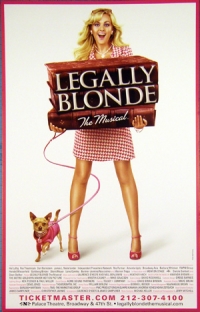
Legally Blonde is a musical based on the Amanda Brown novel and the 2001 film of the same name. The musical features a book by Heather Hach, music and lyrics by Laurence O'Keefe and Nell Benjamin, with direction and choreography by Jerry Mitchell.
After a pre-Broadway tryout in San Francisco, California, the musical opened on Broadway on April 29, 2007 to mostly positive reviews. The musical was recorded for MTV in September 2007 and aired in October 2007.
A United States first national touring production is currently in production.
Legally Blonde played its final performance on Broadway on October 19, 2008.
After a pre-Broadway tryout in San Francisco, California, the musical opened on Broadway on April 29, 2007 to mostly positive reviews. The musical was recorded for MTV in September 2007 and aired in October 2007.
A United States first national touring production is currently in production.
Legally Blonde played its final performance on Broadway on October 19, 2008.
David Mann
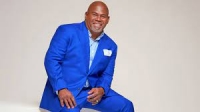
Mann was able to play the piano by ear, at the age of 4, and by age 13, he was playing around Philadelphia. He attended the Curtis Institute of Music. In late 1939, Mann moved to New York and became a Decca Records session musician. He was in Charley Spivak's orchestra until 1941.
Billy Joel

William Martin Joel (born May 9, 1949) is an American pianist and singer-songwriter. He released his first hit song, "Piano Man", in 1973. According to the RIAA, he is the sixth best-selling recording artist in the United States.
Joel had Top 10 hits in the '70s, '80s, and '90s; is a six-time Grammy Award winner, and has sold in excess of 150 million albums worldwide. He was inducted into the Songwriter's Hall of Fame (Class of 1992), the Rock and Roll Hall of Fame (Class of 1999), and the Long Island Music Hall of Fame (Class of 2006). Joel "retired" from recording pop music in 1993 but continued to tour (sometimes with Elton John). In 2001 he subsequently released Fantasies & Delusions, a CD of classical compositions for piano. In 2007 he returned to recording with a single entitled "All My Life," followed by an extensive "World Tour" from 2006-2008, covering many of the major world cities.
Joel had Top 10 hits in the '70s, '80s, and '90s; is a six-time Grammy Award winner, and has sold in excess of 150 million albums worldwide. He was inducted into the Songwriter's Hall of Fame (Class of 1992), the Rock and Roll Hall of Fame (Class of 1999), and the Long Island Music Hall of Fame (Class of 2006). Joel "retired" from recording pop music in 1993 but continued to tour (sometimes with Elton John). In 2001 he subsequently released Fantasies & Delusions, a CD of classical compositions for piano. In 2007 he returned to recording with a single entitled "All My Life," followed by an extensive "World Tour" from 2006-2008, covering many of the major world cities.
Traditional

Tori Amos

Tori Amos (born Myra Ellen Amos on August 22, 1963) is a pianist and singer-songwriter of dual British and American citizenship. She is married to English sound engineer Mark Hawley, with whom she has one child, Natashya "Tash" Lórien Hawley, born on September 5, 2000.
Amos was at the forefront of a number of female singer-songwriters in the early 1990s and was noteworthy early in her career as one of the few alternative rock performers to use a piano as her primary instrument. She is known for emotionally intense songs that cover a wide range of subjects including sexuality, religion and personal tragedy. Some of her charting singles include "Crucify", "Silent All These Years", "Cornflake Girl", "Caught a Lite Sneeze", "Professional Widow", "Spark", and "A Sorta Fairytale".
Amos had sold 12 million records worldwide as of 2005 and has also enjoyed a large cult following. Having a history of making eccentric and at times ribald comments during concerts and interviews, she has earned a reputation for being highly idiosyncratic. As a social commentator and sometimes activist, some of the topics she has been most vocal about include feminism, religion, and sexuality.
Amos was at the forefront of a number of female singer-songwriters in the early 1990s and was noteworthy early in her career as one of the few alternative rock performers to use a piano as her primary instrument. She is known for emotionally intense songs that cover a wide range of subjects including sexuality, religion and personal tragedy. Some of her charting singles include "Crucify", "Silent All These Years", "Cornflake Girl", "Caught a Lite Sneeze", "Professional Widow", "Spark", and "A Sorta Fairytale".
Amos had sold 12 million records worldwide as of 2005 and has also enjoyed a large cult following. Having a history of making eccentric and at times ribald comments during concerts and interviews, she has earned a reputation for being highly idiosyncratic. As a social commentator and sometimes activist, some of the topics she has been most vocal about include feminism, religion, and sexuality.
Giulio Caccini

Giulio Romolo Caccini (also Giulio Romano) (Rome, 8 October 1551 – Florence, buried 10 December 1618) was an Italian composer, teacher, singer, instrumentalist and writer of the late Renaissance and early Baroque eras. He was one of the founders of the genre of opera, and one of the most influential creators of the new Baroque style. He was also the father of the composer Francesca Caccini and the singer Settimia Caccini.
Himig Heswita
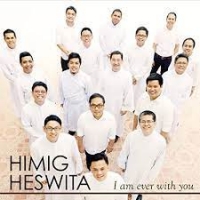
Himig Heswita Musical group Songs Hesus Ng Aking Buhay The Best of Himig Heswita · 2015 I Love the Lord O, Bayan Ng Diyos · 2015 Ito ang Araw 35th Anniversary Commemorative Album · 2016
Rachmaninoff

Sergei Vasilievich Rachmaninoff (1 April 1873 - 28 March 1943) was a Russian composer, pianist, and conductor. He was one of the finest pianists of his day and, as a composer, the last great representative of Russian late Romanticism in classical music. Early influences of Tchaikovsky, Rimsky-Korsakov and other Russian composers gave way to a thoroughly personal idiom which included a pronounced lyricism, expressive breadth, structural ingenuity and a tonal palette of rich, distinctive orchestral colors.
Understandably, the piano figures prominently in Rachmaninoff's compositional output, either as a solo instrument or as part of an ensemble. He made it a point, however, to use his own skills as a performer to explore fully the expressive possibilities of the instrument. Even in his earliest works, he revealed a sure grasp of idiomatic piano writing and a striking gift for melody. In some of his early orchestral pieces he showed the first signs of a talent for tone painting, which he would perfect in The Isle of the Dead, and he began to show a similar penchant for vocal writing in two early sets of songs, Opp. 4 and 8. Rachmaninoff's masterpiece, however, is his choral symphony The Bells, in which all of his talents are fused and unified.
Rachmaninoff sometimes felt threatened by the success of modernists such as Scriabin and Prokofiev and wondered whether to cease composing even before he left Russia. His musical philosophy was rooted in the Russian spiritual tradition, where the role of the artist was to create beauty and to speak the truth from the depths of his heart. In his last major interview, in 1941, he admitted his music, like Russian music, was a product of his temperament. He said, on another occasion, "The new kind of music seems to create not from the heart but from the head. Its composers think rather than feel. They have not the capacity to make their works exalt—they meditate, protest, analyze, reason, calculate and brood, but they do not exalt."
Understandably, the piano figures prominently in Rachmaninoff's compositional output, either as a solo instrument or as part of an ensemble. He made it a point, however, to use his own skills as a performer to explore fully the expressive possibilities of the instrument. Even in his earliest works, he revealed a sure grasp of idiomatic piano writing and a striking gift for melody. In some of his early orchestral pieces he showed the first signs of a talent for tone painting, which he would perfect in The Isle of the Dead, and he began to show a similar penchant for vocal writing in two early sets of songs, Opp. 4 and 8. Rachmaninoff's masterpiece, however, is his choral symphony The Bells, in which all of his talents are fused and unified.
Rachmaninoff sometimes felt threatened by the success of modernists such as Scriabin and Prokofiev and wondered whether to cease composing even before he left Russia. His musical philosophy was rooted in the Russian spiritual tradition, where the role of the artist was to create beauty and to speak the truth from the depths of his heart. In his last major interview, in 1941, he admitted his music, like Russian music, was a product of his temperament. He said, on another occasion, "The new kind of music seems to create not from the heart but from the head. Its composers think rather than feel. They have not the capacity to make their works exalt—they meditate, protest, analyze, reason, calculate and brood, but they do not exalt."
Giovanni Pierluigi da Palestrina
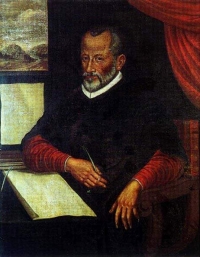
Giovanni Pierluigi da Palestrina (b. 3 February 1525 – 2 February 1526; d. 2 February 1594) was an Italian Renaissance composer and the most well-known 16th-century representative of the Roman School of musical composition. Palestrina became famous through his output of sacred music. He had an enormous influence on the development of Roman Catholic church music, and his work has often been seen as the culmination of Renaissance polyphony. It is only recently, with the discovery and publication of a great deal of hitherto unknown or forgotten music by various Renaissance composers, that we have had the means to properly assess Palestrina in historical context.
Thomas Tomkins
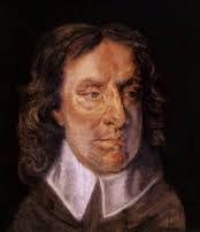
Thomas Tomkins (1572 – 9 June 1656) was a Welsh-born composer of the late Tudor and early Stuart period. In addition to being one of the prominent members of the English Madrigal School, he was a skilled composer of keyboard and consort music, and the last member of the English virginalist school.
Adele

Adele Laurie Blue Adkins (born 5 May 1988 in Enfield, North London), She is the first recipient of the Brit Awards Critics' Choice, which was given to artists who, at the time, had yet to release an album. She debuted at number one with her Mercury Prize nominated debut album 19 in the UK album chart and has since then been certified platinum with sales over 500,000 copies.
Francesco De Gregori

Francesco De Gregori OMRI is an Italian singer-songwriter. In Italy, he is popularly known as "Il Principe dei cantautori", a nickname referring to the elegance of his lyrics. He is often referred as singer-songwriter and poet, although he prefers to be identified simply as "artist".
B2ST

Beast Is the B2ST (Beast Is the Best) is the debut extended play by South Korean boy band Beast. It was released by Cube Entertainment on October 14, 2009 and contains five songs, including the singles "Bad Girl" and "Mystery". The album was a commercial success, selling over 40,000 copies.
Coldplay

Coldplay are a rock band formed in London, England in 1997. The group comprises vocalist/pianist/guitarist Chris Martin, lead guitarist Jonny Buckland, bassist Guy Berryman, and drummer/multi-instrumentalist Will Champion. Coldplay have sold 34.6 million albums, and are also known for their hit singles, such as "Yellow", "The Scientist", "Speed of Sound", "Fix You", "Viva la Vida" and the Grammy Award-winning "Clocks".
Coldplay achieved worldwide fame with the release of their single "Yellow", followed by their debut album, Parachutes (2000), which was nominated for the Mercury Prize. Its follow-up, A Rush of Blood to the Head (2002) won multiple awards such as NME's Album of the Year and was later included on Rolling Stone magazine's 500 Greatest Albums of All Time list, ranking at #473. Their next release, X&Y (2005), received a slightly less enthusiastic yet still generally positive reception. The band's fourth studio album, Viva la Vida or Death and All His Friends (2008), was produced by Brian Eno and released again to largely favourable reviews. All of Coldplay's albums have enjoyed great commercial success.
Coldplay's early material was compared to acts such as Jeff Buckley, U2, and Travis. Coldplay have been an active supporter of various social and political causes, such as Oxfam's Make Trade Fair campaign and Amnesty International. The group have also performed at various charity projects such as Band Aid 20, Live 8, and the Teenage Cancer Trust.
Coldplay achieved worldwide fame with the release of their single "Yellow", followed by their debut album, Parachutes (2000), which was nominated for the Mercury Prize. Its follow-up, A Rush of Blood to the Head (2002) won multiple awards such as NME's Album of the Year and was later included on Rolling Stone magazine's 500 Greatest Albums of All Time list, ranking at #473. Their next release, X&Y (2005), received a slightly less enthusiastic yet still generally positive reception. The band's fourth studio album, Viva la Vida or Death and All His Friends (2008), was produced by Brian Eno and released again to largely favourable reviews. All of Coldplay's albums have enjoyed great commercial success.
Coldplay's early material was compared to acts such as Jeff Buckley, U2, and Travis. Coldplay have been an active supporter of various social and political causes, such as Oxfam's Make Trade Fair campaign and Amnesty International. The group have also performed at various charity projects such as Band Aid 20, Live 8, and the Teenage Cancer Trust.
Gerry Goffin
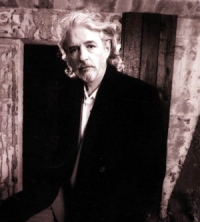
Gerald Goffin (February 11, 1939 – June 19, 2014) was an American lyricist. Collaborating initially with his first wife, Carole King, he co-wrote many international pop hits of the early and mid-1960s, including the US No.1 hits "Will You Love Me Tomorrow", "Take Good Care of My Baby", "The Loco-Motion", and "Go Away Little Girl". It was later said of Goffin that his gift was "to find words that expressed what many young people were feeling but were unable to articulate."
After he and King divorced, Goffin wrote with other composers, including Barry Goldberg and Michael Masser, with whom he wrote "Theme from Mahogany (Do You Know Where You're Going To)" and "Saving All My Love for You", also No.1 hits. During his career Goffin wrote over 114 Billboard Hot 100 hits, including eight chart-toppers, and 72 UK hits. He was inducted into the Rock and Roll Hall of Fame in 1990, with Carole King.
After he and King divorced, Goffin wrote with other composers, including Barry Goldberg and Michael Masser, with whom he wrote "Theme from Mahogany (Do You Know Where You're Going To)" and "Saving All My Love for You", also No.1 hits. During his career Goffin wrote over 114 Billboard Hot 100 hits, including eight chart-toppers, and 72 UK hits. He was inducted into the Rock and Roll Hall of Fame in 1990, with Carole King.
Gloria Estefan

Gloria Estefan (born Gloria María Fajardo on September 1, 1957) is a Cuban American singer and songwriter. she is in the top 100 of best selling music artists with over 90 million albums sold worldwide, with 15.5 million of those alone in the United States. She has won five Grammy Awards becoming among the most successful crossover performers in Latin music to date.
She will be awarded by the Latin Grammy Award Recording Association as the "Person of the Year" in the ceremony to be aired on November 2008, the award will be given to her for her long career of more than 20 years and her worldwide success, she's also the first female singer to receive this prestigious award.
She will be awarded by the Latin Grammy Award Recording Association as the "Person of the Year" in the ceremony to be aired on November 2008, the award will be given to her for her long career of more than 20 years and her worldwide success, she's also the first female singer to receive this prestigious award.
Elvis Costello
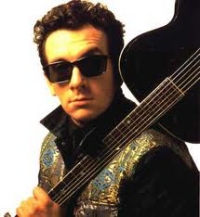
Elvis Costello (born Declan Patrick MacManus, 25 August 1954) is an English singer-songwriter. He came to prominence as an early participant in London's pub rock scene in the mid-1970s and later became associated with the punk/New Wave genre. Steeped in word play, the vocabulary of Costello's lyrics is broader than that of most popular songs. His music has drawn on many diverse genres; one critic described him as a "pop encyclopedia", able to "reinvent the past in his own image".
Costello has won multiple awards in his career, including a Grammy Award, and has twice been nominated for the Brit Award for Best British Male. In 2003, Elvis Costello & the Attractions was inducted into the Rock and Roll Hall of Fame. In 2004, Rolling Stone ranked Costello number 80 on their list of the 100 Greatest Artists of All Time.
Costello has won multiple awards in his career, including a Grammy Award, and has twice been nominated for the Brit Award for Best British Male. In 2003, Elvis Costello & the Attractions was inducted into the Rock and Roll Hall of Fame. In 2004, Rolling Stone ranked Costello number 80 on their list of the 100 Greatest Artists of All Time.
Wayne Watson

Wayne Watson (born October 5, 1954) is an American singer-songwriter in contemporary Christian music. Some of his songs have become CCM classics, including "Another Time, Another Place", "For Such a Time as This", "Friend of a Wounded Heart", "Touch of the Master's Hand", "New Lives for Old" and "Watercolour Ponies". He has won eight GMA Dove Awards.
Radiohead

Radiohead are an English alternative rock band from Oxfordshire. The band is composed of Thom Yorke (lead vocals, rhythm guitar, piano, electronics), Jonny Greenwood (lead guitar, other instruments), Ed O'Brien (guitar, backing vocals), Colin Greenwood (bass guitar, synthesisers) and Phil Selway (drums, percussion). Since 1993, Radiohead have released seven studio albums. The band have sold over 25 million albums as of 2007.
Radiohead released their first single, "Creep", in 1992. Their debut album, Pablo Honey, followed in 1993. "Creep" was initially unsuccessful, but the song became a worldwide hit when reissued a year later, and the band were almost branded as one hit wonders. Radiohead's popularity in the United Kingdom increased with the release of their second album, The Bends (1995). The band's textured guitar atmospheres and Yorke's falsetto singing were warmly received by critics and fans. Radiohead's third album, OK Computer (1997), propelled the band to greater fame worldwide. Featuring an expansive sound and themes of alienation from the modern world, OK Computer has often been acclaimed as a landmark record of the 1990s.
The release of Kid A (2000) and Amnesiac (2001) saw Radiohead reach the peak of their popularity, although the albums divided critical opinion. This period marked a change in Radiohead's musical style, with their incorporation of avant-garde electronic music, Krautrock and jazz influences. Hail to the Thief (2003), which mixed guitar-driven rock with electronics and contemporary lyrics, was the band's final album for their record label, EMI. Radiohead's seventh album, In Rainbows (2007), was first released independently as a digital download for which customers selected their own price, later meeting with critical and chart success.
Radiohead released their first single, "Creep", in 1992. Their debut album, Pablo Honey, followed in 1993. "Creep" was initially unsuccessful, but the song became a worldwide hit when reissued a year later, and the band were almost branded as one hit wonders. Radiohead's popularity in the United Kingdom increased with the release of their second album, The Bends (1995). The band's textured guitar atmospheres and Yorke's falsetto singing were warmly received by critics and fans. Radiohead's third album, OK Computer (1997), propelled the band to greater fame worldwide. Featuring an expansive sound and themes of alienation from the modern world, OK Computer has often been acclaimed as a landmark record of the 1990s.
The release of Kid A (2000) and Amnesiac (2001) saw Radiohead reach the peak of their popularity, although the albums divided critical opinion. This period marked a change in Radiohead's musical style, with their incorporation of avant-garde electronic music, Krautrock and jazz influences. Hail to the Thief (2003), which mixed guitar-driven rock with electronics and contemporary lyrics, was the band's final album for their record label, EMI. Radiohead's seventh album, In Rainbows (2007), was first released independently as a digital download for which customers selected their own price, later meeting with critical and chart success.
Noël Tredinnick
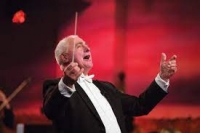
Dr Noël Harwood Tredinnick BEM FRSCM is a British composer, organist, orchestrator and conductor. He was awarded a Lambeth DMus degree in March 2002. In Queen Elizabeth's Birthday Honours bestowed in 2021, he received a BEM for life-long services to Church Music and Music Education.
Aerosmith

Aerosmith is an American hard rock band, sometimes referred to as "The Bad Boys from Boston" The band was formed in Boston, Massachusetts in 1970. Guitarist Joe Perry and bassist Tom Hamilton, originally in a band together called the Jam Band, met up with singer Steven Tyler, drummer Joey Kramer, and guitarist Ray Tabano, and formed Aerosmith. By 1971, Tabano was replaced by Brad Whitford, and the band began developing a following in Boston.
They were signed to Columbia Records in 1972 and released a string of multi-platinum albums, beginning with their 1973 eponymous debut album. In 1975, the band broke into the mainstream with the album Toys in the Attic, and their 1976 follow-up Rocks cemented their status as hard rock superstars. The band did not fare well between 1980 and 1984, releasing a lone album, Rock in a Hard Place, which only went gold, failing to match the successes of their previous efforts.
Although Perry and Whitford returned in 1984 and the band signed a new deal with Geffen Records, it wasn't until the band sobered up and released 1987's Permanent Vacation that they regained the level of popularity they had experienced in the 1970s. After 38 years of performing, the band continues to tour and record music.
They were signed to Columbia Records in 1972 and released a string of multi-platinum albums, beginning with their 1973 eponymous debut album. In 1975, the band broke into the mainstream with the album Toys in the Attic, and their 1976 follow-up Rocks cemented their status as hard rock superstars. The band did not fare well between 1980 and 1984, releasing a lone album, Rock in a Hard Place, which only went gold, failing to match the successes of their previous efforts.
Although Perry and Whitford returned in 1984 and the band signed a new deal with Geffen Records, it wasn't until the band sobered up and released 1987's Permanent Vacation that they regained the level of popularity they had experienced in the 1970s. After 38 years of performing, the band continues to tour and record music.
Dido
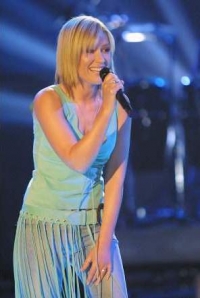
Dido Florian Cloud de Bounevialle O'Malley Armstrong (born 25 December 1971), is an English BRIT Award-winning and Grammy Award-nominated singer and songwriter.
Dido's mother, Claire (born Collins), is a French poet and her father, William O'Malley Armstrong (9 November 1938 – 22 December 2006) was an Irish publisher and former managing director of Sidgwick & Jackson.
Informally named after the mythical Carthaginian queen, Dido was educated at Thornhill Primary, City of London Girls' and Westminster School. Because she was born on Christmas Day, in childhood she celebrated, rather in the manner of the British monarch, an "official" birthday on 25 June.
After she stole a recorder from school at age five, her parents enrolled her at the Guildhall School of Music in London, England. By the time she reached her teens Dido had learned to play the piano, recorder and the violin. After her teens and whilst working as a literary agent, Dido studied law at Birkbeck, University of London, however, she never completed this course, deciding instead to take up music full-time. After learning the guitar, she showcased her skills to audiences during her 2004 Life for Rent tour.
Dido's mother, Claire (born Collins), is a French poet and her father, William O'Malley Armstrong (9 November 1938 – 22 December 2006) was an Irish publisher and former managing director of Sidgwick & Jackson.
Informally named after the mythical Carthaginian queen, Dido was educated at Thornhill Primary, City of London Girls' and Westminster School. Because she was born on Christmas Day, in childhood she celebrated, rather in the manner of the British monarch, an "official" birthday on 25 June.
After she stole a recorder from school at age five, her parents enrolled her at the Guildhall School of Music in London, England. By the time she reached her teens Dido had learned to play the piano, recorder and the violin. After her teens and whilst working as a literary agent, Dido studied law at Birkbeck, University of London, however, she never completed this course, deciding instead to take up music full-time. After learning the guitar, she showcased her skills to audiences during her 2004 Life for Rent tour.
The Beatles

The Beatles were a pop and rock group from Liverpool, England formed in 1960. Primarily consisting of John Lennon (rhythm guitar, vocals), Paul McCartney (bass guitar, vocals), George Harrison (lead guitar, vocals) and Ringo Starr (drums, vocals) throughout their career, The Beatles are recognised for leading the mid-1960s musical "British Invasion" into the United States. Although their initial musical style was rooted in 1950s rock and roll and homegrown skiffle, the group explored genres ranging from Tin Pan Alley to psychedelic rock. Their clothes, styles, and statements made them trend-setters, while their growing social awareness saw their influence extend into the social and cultural revolutions of the 1960s. After the band broke up in 1970, all four members embarked upon solo careers.
The Beatles are one of the most commercially successful and critically acclaimed bands in the history of popular music, selling over a billion records internationally. In the United Kingdom, The Beatles released more than 40 different singles, albums, and EPs that reached number one, earning more number one albums (15) than any other group in UK chart history. This commercial success was repeated in many other countries; their record company, EMI, estimated that by 1985 they had sold over one billion records worldwide. According to the Recording Industry Association of America, The Beatles have sold more albums in the United States than any other band. In 2004, Rolling Stone magazine ranked The Beatles number one on its list of 100 Greatest Artists of All Time. According to that same magazine, The Beatles' innovative music and cultural impact helped define the 1960s, and their influence on pop culture is still evident today. In 2008, Billboard magazine released a list of top-selling Hot 100 artists to celebrate the chart's fiftieth anniversary; The Beatles reached #1 again.
The Beatles are one of the most commercially successful and critically acclaimed bands in the history of popular music, selling over a billion records internationally. In the United Kingdom, The Beatles released more than 40 different singles, albums, and EPs that reached number one, earning more number one albums (15) than any other group in UK chart history. This commercial success was repeated in many other countries; their record company, EMI, estimated that by 1985 they had sold over one billion records worldwide. According to the Recording Industry Association of America, The Beatles have sold more albums in the United States than any other band. In 2004, Rolling Stone magazine ranked The Beatles number one on its list of 100 Greatest Artists of All Time. According to that same magazine, The Beatles' innovative music and cultural impact helped define the 1960s, and their influence on pop culture is still evident today. In 2008, Billboard magazine released a list of top-selling Hot 100 artists to celebrate the chart's fiftieth anniversary; The Beatles reached #1 again.
Orlando Gibbons
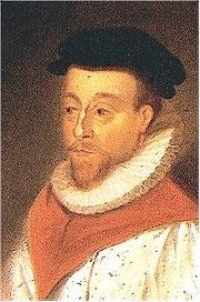
Orlando Gibbons (baptised 25 December 1583 - 5 June 1625) was an English composer, virginalist and organist of the late Tudor and early Jacobean periods. He was a leading composer in the England of his day.
Take 6

Take 6 is an American a cappella gospel sextet formed in 1980 on the campus of Oakwood College in Huntsville, Alabama. The group integrates jazz with spiritual and inspirational lyrics. Take 6 has received Grammy Awards as well as Dove Awards, a Soul Train Award and nominations for the NAACP Image Award. The band has worked with Ray Charles, Nnenna Freelon, Gordon Goodwin, Don Henley, Whitney Houston, Al Jarreau, Quincy Jones, k.d. lang, Queen Latifah, The Manhattan Transfer, Brian McKnight, Luis Miguel, Marcus Miller, Joe Sample, Ben Tankard, CeCe Winans, Stevie Wonder and Jacob Collier. All original members grew up in the Seventh-day Adventist Church.
Tim Rice
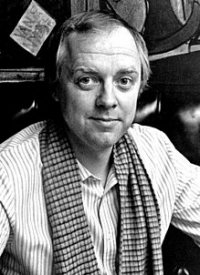
Sir Timothy Miles Bindon Rice (born 10 November 1944) is an English author and Academy Award, Golden Globe Award, Emmy Award, Tony Award, and Grammy Award-winning lyricist. He is best known for his collaborations with Andrew Lloyd Webber, with whom he wrote Joseph and the Amazing Technicolor Dreamcoat, Jesus Christ Superstar, and Evita; with Björn Ulvaeus and Benny Andersson of ABBA, with whom he wrote Chess; for additional songs for the 2011 West End revival of The Wizard of Oz; and for his work with Alan Menken on Disney's Aladdin, Beauty and the Beast, and the musical King David. He also worked with Elton John on Disney's The Lion King, the musical Aida, and DreamWorks Animation's The Road to El Dorado and Ennio Morricone.
One of the most celebrated lyricists in British popular culture, Rice was knighted by Elizabeth II for services to music in 1994. He has a star on the Hollywood Walk of Fame, is an inductee into the Songwriter's Hall of Fame, is a Disney Legend recipient, and is a fellow of the British Academy of Songwriters, Composers and Authors. The 2016 Sunday Times Rich List values Rice at £150m; the 15th-richest music millionaire in the UK. He is one of fifteen artists to have won an Emmy, Grammy, Oscar, and Tony award.
One of the most celebrated lyricists in British popular culture, Rice was knighted by Elizabeth II for services to music in 1994. He has a star on the Hollywood Walk of Fame, is an inductee into the Songwriter's Hall of Fame, is a Disney Legend recipient, and is a fellow of the British Academy of Songwriters, Composers and Authors. The 2016 Sunday Times Rich List values Rice at £150m; the 15th-richest music millionaire in the UK. He is one of fifteen artists to have won an Emmy, Grammy, Oscar, and Tony award.
Frederick Loewe
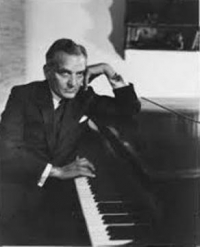
Frederick Loewe, was an Austrian-American composer. He collaborated with lyricist Alan Jay Lerner on a series of Broadway musicals, including My Fair Lady and Camelot, both of which were made into films.
Fame
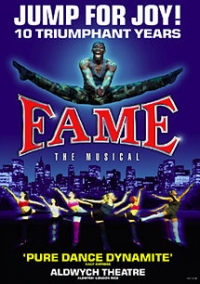
Fame – The Musical (based on the 1980 movie by Alan Parker) conceived and developed by David De Silva is a musical with a book by Jose Fernandez, music by Steve Margoshes and lyrics by Jacques Levy. De Silva was fascinated by New York's High School for Performing Arts (Which became Fiorello H. LaGuardia HS of Music and Art and Performing Arts in 1984) and created first the 1980 film about how the dedicated students there were inspired by the arts. The film was followed by a long-running television series, a reality show, and finally the musical. The musical is significantly rewritten from the previous adaptations, with an almost entirely new score.
First produced in 1988 in Miami, Florida, Fame – the Musical has enjoyed numerous professional and amateur productions. The musical has been seen by nearly 4 million people since its West End premiere in 1995. The West End production was nominated for 2 Laurence Olivier Awards. The show played in New York Off-Broadway at the Little Schubert Theatre in 2003-04, for a total of 304 performances. On April 4, 2008 FAME opened in Paris at the Teatre Comedia to great acclaim. The American debut of the sequel production entitled Fame Forever: Reunion and Rebirth opened September 21 with a gala performance and continued through September 30, 2007 at the Waterville Opera House, Waterville, Maine. It also received a co-debut at The Players of Sarasota in Sarasota, Florida opening around the same time, but running to October 7th. This debut show at The Players, as it is called locally, was directed by legendary performer,choreographer, and actor Thomas DeWyane Barrett.
First produced in 1988 in Miami, Florida, Fame – the Musical has enjoyed numerous professional and amateur productions. The musical has been seen by nearly 4 million people since its West End premiere in 1995. The West End production was nominated for 2 Laurence Olivier Awards. The show played in New York Off-Broadway at the Little Schubert Theatre in 2003-04, for a total of 304 performances. On April 4, 2008 FAME opened in Paris at the Teatre Comedia to great acclaim. The American debut of the sequel production entitled Fame Forever: Reunion and Rebirth opened September 21 with a gala performance and continued through September 30, 2007 at the Waterville Opera House, Waterville, Maine. It also received a co-debut at The Players of Sarasota in Sarasota, Florida opening around the same time, but running to October 7th. This debut show at The Players, as it is called locally, was directed by legendary performer,choreographer, and actor Thomas DeWyane Barrett.
Bob Carleton
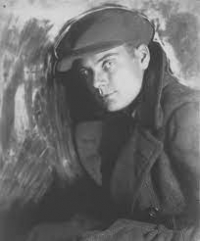
Robert Louis Carleton was an American pianist and composer of popular music. He grew up in St Louis, Missouri, the son of a saloon keeper, and was earning a living by age 15 as a theatre musician. He composed over 500 songs, including the World War I hit, "Ja-Da" in 1918.
Rockapella

Rockapella is an American a cappella musical group formed in 1986 in New York City. The group's name is an amalgam of "rock" and "a cappella"
Grease
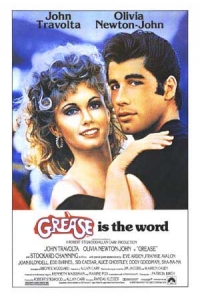
Grease is a film directed by Randal Kleiser and based on Jim Jacobs' and Warren Casey's musical, Grease. The film stars John Travolta, Olivia Newton-John, Stockard Channing, Jeff Conaway, and Eve Arden. It was originally released to theatres on June 16, 1978. It was filmed at Venice High School in Venice, California. It was released in the U.S. on VHS during the 1980s; the latest VHS release was June 23, 1998 as 20th Anniversary Edition following a theatrical re-release that March. On September 24, 2002, it was released on DVD for the first time. On September 19, 2006, it was re-released on DVD as the Rockin' Rydell Edition, which includes a black Rydell High T-Bird jacket cover or the Target-exclusive Pink Ladies cover.
Nat King Cole
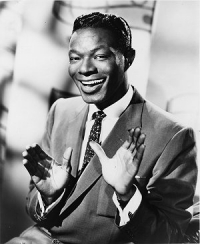
Nathaniel Adams Coles (March 17, 1919 â February 15, 1965), known professionally as Nat King Cole, was an American musician.
Cole first came to prominence as a leading jazz pianist, then switched his emphasis to singing, becoming one of the most popular and best known vocalists of all time.
Cole's first mainstream vocal hit was his 1943 recording of one of his compositions, "Straighten Up and Fly Right", based on a black folk tale that his father had used as a theme for a sermon. Johnny Mercer invited him to record it for the fledgling Capitol Records label. It sold over 500,000 copies, and proved that folk-based material could appeal to a wide audience. Although Nat would never be considered a rocker, the song can be seen as anticipating the first rock and roll records. Indeed, Bo Diddley, who performed similar transformations of folk material, counted Cole as an influence.
Beginning in the late 1940s, Cole began recording and performing more pop-oriented material for mainstream audiences, often accompanied by a string orchestra. His stature as a popular icon was cemented during this period by hits such as "The Christmas Song" (Cole recorded the tune four times: June 14, 1946 as a pure Trio recording; August 19, 1946 with an added string section; August 24, 1953; and again in 1961 for the double album, The Nat King Cole Story. This final version, recorded in stereo, is the one most often heard today.), "Nature Boy" (1948), "Mona Lisa" (1950), "Too Young" (the #1 song in 1951), and his signature tune "Unforgettable" (1951). While this shift to pop music led some jazz critics and fans to accuse Cole of selling out, he never totally abandoned his jazz roots; as late as 1956, for instance, he recorded an all-jazz album, After Midnight.
His last album, L-O-V-E, was recorded in early December 1964 â just a few days before entering the hospital for lung cancer treatment â and released just prior to his death; it peaked at #4 on the Billboard Albums chart in the spring of 1965. A Best Of album went gold in 1968. His 1957 recording of "When I Fall In Love" reached #4 in the UK charts in 1987.
Cole first came to prominence as a leading jazz pianist, then switched his emphasis to singing, becoming one of the most popular and best known vocalists of all time.
Cole's first mainstream vocal hit was his 1943 recording of one of his compositions, "Straighten Up and Fly Right", based on a black folk tale that his father had used as a theme for a sermon. Johnny Mercer invited him to record it for the fledgling Capitol Records label. It sold over 500,000 copies, and proved that folk-based material could appeal to a wide audience. Although Nat would never be considered a rocker, the song can be seen as anticipating the first rock and roll records. Indeed, Bo Diddley, who performed similar transformations of folk material, counted Cole as an influence.
Beginning in the late 1940s, Cole began recording and performing more pop-oriented material for mainstream audiences, often accompanied by a string orchestra. His stature as a popular icon was cemented during this period by hits such as "The Christmas Song" (Cole recorded the tune four times: June 14, 1946 as a pure Trio recording; August 19, 1946 with an added string section; August 24, 1953; and again in 1961 for the double album, The Nat King Cole Story. This final version, recorded in stereo, is the one most often heard today.), "Nature Boy" (1948), "Mona Lisa" (1950), "Too Young" (the #1 song in 1951), and his signature tune "Unforgettable" (1951). While this shift to pop music led some jazz critics and fans to accuse Cole of selling out, he never totally abandoned his jazz roots; as late as 1956, for instance, he recorded an all-jazz album, After Midnight.
His last album, L-O-V-E, was recorded in early December 1964 â just a few days before entering the hospital for lung cancer treatment â and released just prior to his death; it peaked at #4 on the Billboard Albums chart in the spring of 1965. A Best Of album went gold in 1968. His 1957 recording of "When I Fall In Love" reached #4 in the UK charts in 1987.
Moses Hogan
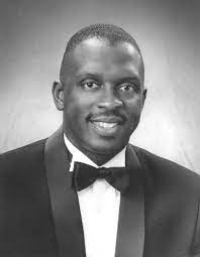
Moses George Hogan was an American composer and arranger of choral music. He was best known for his settings of spirituals. Hogan was a pianist, conductor, and arranger of international renown. His works are celebrated and performed by high school, college, church, community, and professional choirs today.
John Lennon
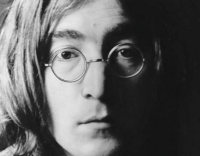
John Winston Ono Lennon, MBE (born John Winston Lennon; October 9, 1940 – December 8, 1980) was an English rock musician, singer, songwriter, artist, and peace activist who gained worldwide fame as one of the founding members of The Beatles. As a member of the group, Lennon was one of the lead vocalists and co-wrote many of the band's songs with Paul McCartney.
In his solo career, Lennon wrote and recorded songs such as "Give Peace a Chance" and "Imagine". Lennon revealed his rebellious nature and wit on television, in films such as A Hard Day's Night, in books such as In His Own Write, and in press conferences and interviews. He was controversial through his work as a peace activist, artist, and author.
Lennon had two sons: Julian Lennon, with his first wife Cynthia Lennon, and Sean Ono Lennon, with his second wife, avant-garde artist Yoko Ono. After a self-imposed retirement from 1976 to 1980, Lennon reemerged with a comeback album, but was murdered one month later in New York City on 8 December 1980. In 2002, respondents to a BBC poll on the 100 Greatest Britons voted Lennon into eighth place. In 2004, Rolling Stone magazine ranked Lennon number 38 on its list of "The Immortals: The Fifty Greatest Artists of All Time" and ranked The Beatles at number one.
In his solo career, Lennon wrote and recorded songs such as "Give Peace a Chance" and "Imagine". Lennon revealed his rebellious nature and wit on television, in films such as A Hard Day's Night, in books such as In His Own Write, and in press conferences and interviews. He was controversial through his work as a peace activist, artist, and author.
Lennon had two sons: Julian Lennon, with his first wife Cynthia Lennon, and Sean Ono Lennon, with his second wife, avant-garde artist Yoko Ono. After a self-imposed retirement from 1976 to 1980, Lennon reemerged with a comeback album, but was murdered one month later in New York City on 8 December 1980. In 2002, respondents to a BBC poll on the 100 Greatest Britons voted Lennon into eighth place. In 2004, Rolling Stone magazine ranked Lennon number 38 on its list of "The Immortals: The Fifty Greatest Artists of All Time" and ranked The Beatles at number one.
Guns N' Roses

Guns N 'Roses is an American rock band founded in 1985 in Los Angeles, California. Axl Rose, Slash, Izzy Stradlin, Duff McKagan, and Steven , Genres: Hard rock, Heavy metal, Blues rock, Glam rock They started their music life in Los Angeles, California, USA (1985) Albums: Appetite for Destruction, Use Your Illusion I
Ben Folds

Benjamin Scott Folds (born September 12, 1966 in Winston-Salem, North Carolina) is an American singer and pianist. He originally gained fame as a member of the rock band, Ben Folds Five. Ben has released three solo albums: Fear of Pop: Volume 1, Rockin' the Suburbs, and Ben Folds Live. Fear of Pop was released while Ben Folds Five were still together; Suburbs and Live were released afterwards. Since Fear of Pop is highly experimental and Live is a collection of live solo recordings of mostly songs originally recorded with Ben Folds Five, Rockin' the Suburbs is Ben's first proper solo release. In late 2003 two solo EPs: Speed Graphic and Sunny 16 were released, with a third entitled Super D released in mid-2004. He currently resides in Adelaide, Australia with his wife, Frally Hynes, and two children, Louis and Grace. He tours Japan and the United States, as well as other parts of the world periodically.
Folds also produced and arranged the most recent William Shatner album, Has Been (2004); he previously worked with Shatner on the songs 'In Love' and 'Still in Love' for Fear of Pop.
Folds described his former band, Ben Folds Five, as 'punk rock for sissies,' and his oddball lyrics often contain nuances of depression, melancholy and self-conflict. While he was with the band Ben Folds Five and since his departure, Folds also provided a number of songs for films soundtrack. Some of these include 'Lonely Christmas Eve' for the film How the Grinch Stole Christmas! (2000) and a rendition of the Beatles' 'Golden Slumbers' for the film I Am Sam (2001).
On a planned tour of Australia, Folds teamed up with fellow namesakes Ben Kweller and Ben Lee to travel the country together as The Bens, at the suggestion of a fan on Ben Kweller's official website. The trio also went on to record an four-track EP together, entitled The Bens.
In summer of 2004, Folds co-headlined an American tour with fellow rockers Rufus Wainwright and Guster. His fourth solo album entitled 'Songs for Silverman' is slated for release on April 26, 2005.
Folds also produced and arranged the most recent William Shatner album, Has Been (2004); he previously worked with Shatner on the songs 'In Love' and 'Still in Love' for Fear of Pop.
Folds described his former band, Ben Folds Five, as 'punk rock for sissies,' and his oddball lyrics often contain nuances of depression, melancholy and self-conflict. While he was with the band Ben Folds Five and since his departure, Folds also provided a number of songs for films soundtrack. Some of these include 'Lonely Christmas Eve' for the film How the Grinch Stole Christmas! (2000) and a rendition of the Beatles' 'Golden Slumbers' for the film I Am Sam (2001).
On a planned tour of Australia, Folds teamed up with fellow namesakes Ben Kweller and Ben Lee to travel the country together as The Bens, at the suggestion of a fan on Ben Kweller's official website. The trio also went on to record an four-track EP together, entitled The Bens.
In summer of 2004, Folds co-headlined an American tour with fellow rockers Rufus Wainwright and Guster. His fourth solo album entitled 'Songs for Silverman' is slated for release on April 26, 2005.
Bellini
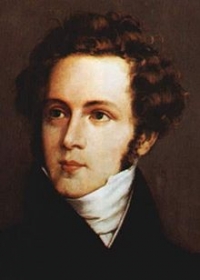
Vincenzo Salvatore Carmelo Francesco Bellini (3 November 1801 – 23 September 1835) was an Italian opera composer. His greatest works are I Capuleti ed i Montecchi (1830), La sonnambula (1831), Norma (1831), Beatrice di Tenda (1833), and I puritani (1835). Known for his long-flowing melodic lines, for which he was named "the Swan of Catania," Bellini was the quintessential composer of bel canto opera.
William Augustine Ogden
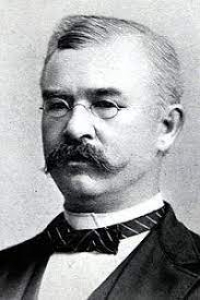
William Augustine Ogden was an American composer, especially of church music and hymns, choir conductor and educator. He served in the 30th Indiana Volunteer Infantry during the American Civil War and organized a male voice choir, which became well known in the Army of the Cumberland.
Hoagy Carmichael
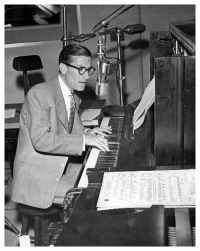
Hoagland Howard "Hoagy" Carmichael (November 22, 1899 – December 27, 1981) was an American composer, pianist, singer, actor, and bandleader. He is best known for writing the melody to "Stardust" (1927), one of the most-recorded American songs of all time. Carmichael spelled it "Star Dust", but the space is usually omitted.
Alec Wilder, in his study of the American popular song, concluded that Hoagy Carmichael was the "most talented, inventive, sophisticated and jazz-oriented" of the hundreds of writers composing pop songs in the first half of the 20th century.
Carmichael finished and recorded one of his most famous songs, the sophisticated "Star Dust" (later re-named "Stardust", with lyrics), at the Gennett Records studio in Richmond, Indiana, with Carmichael doing the piano solo. The song, an idiosyncratic melody in medium tempo, actually a song about a song, later became the quintessential American standard, recorded by dozens of artists. Shortly thereafter, Carmichael got bigtime recognition when Paul Whiteman recorded "Washboard Blues", with Carmichael playing and singing, and the Dorsey brothers and Bix Beiderbecke in the orchestra. Despite his growing fame, at this stage Carmichael was still somewhat handicapped by his inability to sight-read and notate music properly, though clearly innovative and talented. With coaching, he soon became more proficient at arranging his own music.
Alec Wilder, in his study of the American popular song, concluded that Hoagy Carmichael was the "most talented, inventive, sophisticated and jazz-oriented" of the hundreds of writers composing pop songs in the first half of the 20th century.
Carmichael finished and recorded one of his most famous songs, the sophisticated "Star Dust" (later re-named "Stardust", with lyrics), at the Gennett Records studio in Richmond, Indiana, with Carmichael doing the piano solo. The song, an idiosyncratic melody in medium tempo, actually a song about a song, later became the quintessential American standard, recorded by dozens of artists. Shortly thereafter, Carmichael got bigtime recognition when Paul Whiteman recorded "Washboard Blues", with Carmichael playing and singing, and the Dorsey brothers and Bix Beiderbecke in the orchestra. Despite his growing fame, at this stage Carmichael was still somewhat handicapped by his inability to sight-read and notate music properly, though clearly innovative and talented. With coaching, he soon became more proficient at arranging his own music.
Taylor Swift

Taylor Alison Swift (born December 13, 1989) is an American country-pop singer-songwriter. In 2006, she released her debut single "Tim McGraw", which peaked at number six on the Billboard country charts. Later in October 2006, she released her self-titled debut album, which produced five hit singles on the Billboard Hot Country Songs charts and was certified 3× Multi-Platinum by the RIAA. The New York Times described Swift as "one of pop's finest songwriters, country’s foremost pragmatist and more in touch with her inner life than most adults".
According to Nielsen SoundScan, Swift was the biggest selling artist of 2008 in America with combined sales of more than four million albums. Swift's Fearless and her self-titled album finished 2008 at number three and number six respectively, with sales of 2.1 and 1.5 million. She was the first artist in the history of Nielsen SoundScan to have two different albums in the Top 10 on the year end album chart. Fearless has topped the Billboard 200 in 11 non-consecutive weeks. No album has spent more time at number one since 1999-2000. It also was the first album by a female artist in country music history to log eight weeks at #1 on The Billboard 200. In mid-January 2009, Swift became the first country artist to top the 2 million mark in paid downloads with three different songs. As of the week ending February 8, 2009, Swift's single "Love Story" became the country song with most paid downloads in history and the first country song to top the Mainstream Top 40 chart. According to the 2009 issue of Forbes, Swift is ranked as the 69th most powerful celebrity with over $18 million dollars in earnings this year.
According to Nielsen SoundScan, Swift was the biggest selling artist of 2008 in America with combined sales of more than four million albums. Swift's Fearless and her self-titled album finished 2008 at number three and number six respectively, with sales of 2.1 and 1.5 million. She was the first artist in the history of Nielsen SoundScan to have two different albums in the Top 10 on the year end album chart. Fearless has topped the Billboard 200 in 11 non-consecutive weeks. No album has spent more time at number one since 1999-2000. It also was the first album by a female artist in country music history to log eight weeks at #1 on The Billboard 200. In mid-January 2009, Swift became the first country artist to top the 2 million mark in paid downloads with three different songs. As of the week ending February 8, 2009, Swift's single "Love Story" became the country song with most paid downloads in history and the first country song to top the Mainstream Top 40 chart. According to the 2009 issue of Forbes, Swift is ranked as the 69th most powerful celebrity with over $18 million dollars in earnings this year.
Stevan Stojanovic Mokranjac
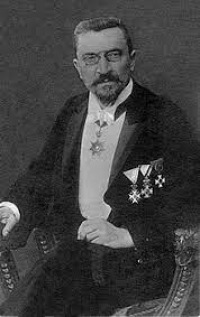
Stevan Stojanović, known as Stevan Mokranjac was a Serbian composer and music educator. Born in Negotin in 1856, Mokranjac studied music in Belgrade, Munich, Rome and Leipzig while in his twenties.
The Spitfire Grill
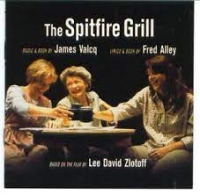
After being released from jail, Percy Talbott (Alison Elliott) travels to a town in Maine looking for a new beginning. When she arrives, she finds work at a restaurant owned by the crabby Hannah (Ellen Burstyn). She also befriends a waitress named Shelby (Marcia Gay Harden) and begins a romance with…
The Carpenters
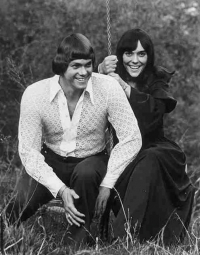
The Carpenters were a vocal and instrumental duo, consisting of siblings Karen and Richard Carpenter. Though often referred to by the public as "The Carpenters", the duo's official name on authorized recordings and press materials is simply "Carpenters", without the definite article. During a period in the 1970s when louder and wilder rock was in great demand, Richard and Karen produced a distinctively soft musical style that made them one of the best-selling music artists of all time.
The Carpenters' melodic pop charted a record-breaking score of hit recordings on the American Top 40 and Adult Contemporary charts, becoming leading sellers in the soft rock, easy listening and adult contemporary genres. The Carpenters had three #1 singles on the Billboard Hot 100 and fifteen #1 hits on the Adult Contemporary Chart (see The Carpenters discography). In addition, they had twelve top 10 singles (including their #1 hits). To date, The Carpenters' album and single sales total more than 100 million units.
During their fourteen-year career, The Carpenters recorded eleven albums, five of which contained top 10 singles (Close to You, Carpenters, A Song for You, Now & Then and Horizon), thirty-one singles, five television specials, and one short-lived television series. They toured in the United States, the United Kingdom, Japan, Australia, the Netherlands and Belgium. Their recording career ended with Karen's death on February 4, 1983. Karen passed away due to a cardiac arrest due to complications of anorexia nervosa. Extensive news coverage of the circumstances surrounding her death increased public awareness of the consequences of eating disorders.
The Carpenters' melodic pop charted a record-breaking score of hit recordings on the American Top 40 and Adult Contemporary charts, becoming leading sellers in the soft rock, easy listening and adult contemporary genres. The Carpenters had three #1 singles on the Billboard Hot 100 and fifteen #1 hits on the Adult Contemporary Chart (see The Carpenters discography). In addition, they had twelve top 10 singles (including their #1 hits). To date, The Carpenters' album and single sales total more than 100 million units.
During their fourteen-year career, The Carpenters recorded eleven albums, five of which contained top 10 singles (Close to You, Carpenters, A Song for You, Now & Then and Horizon), thirty-one singles, five television specials, and one short-lived television series. They toured in the United States, the United Kingdom, Japan, Australia, the Netherlands and Belgium. Their recording career ended with Karen's death on February 4, 1983. Karen passed away due to a cardiac arrest due to complications of anorexia nervosa. Extensive news coverage of the circumstances surrounding her death increased public awareness of the consequences of eating disorders.
Jack Johnson
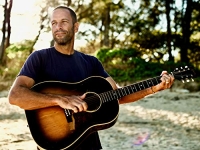
Jack Hody Johnson (born May 18, 1975) is an American singer-songwriter, multi-instrumentalist, actor, record producer, documentary filmmaker and former professional surfer. Johnson is known primarily for his work in the soft rock and acoustic pop genres. In 2001, he achieved commercial success after the release of his debut album, Brushfire Fairytales. Johnson has reached number one on the Billboard 200 chart with his albums Sing-A-Longs and Lullabies for the Film Curious George in 2006, Sleep Through the Static in 2008, To the Sea in 2010 and From Here to Now to You in 2013. His album In Between Dreams peaked at number two on the chart in 2005 and again in 2013.
Columbo
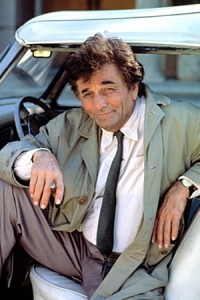
Columbo (/kəˈlʌmboʊ/) is an American crime drama television series starring Peter Falk as Columbo, a homicide detective with the Los Angeles Police Department. After 2 pilot episodes in 1968 and 1971, the show originally aired on NBC from 1971 to 1978 as one of the rotating programs of The NBC Mystery Movie. Columbo then aired less frequently on ABC from 1989 to 2003.Columbo is a shrewd but inelegant blue-collar homicide detective whose trademarks include his rumpled beige raincoat, unassuming demeanor, cigar, old Peugeot 403 car, and unseen wife (whom he mentions frequently). He often leaves a room only to return with the catchphrase "Just one more thing" to ask a critical question.
David Crowder

David Wallace Crowder (born November 29, 1971), known professionally by his mononymous stage name Crowder since 2012, is an American Contemporary Christian music singer, songwriter, multi-instrumentalist and author. He was the lead singer in the now defunct David Crowder Band, before he started his solo career in 2012 on sixstepsrecords and Sparrow Records labels. He released his first solo album Neon Steeple on May 27, 2014. Crowder released his first solo single off the album, "I Am", on November 25, 2013, which rose to the No. 3 position on the Christian Songs chart. American Prodigal, Crowder's second solo album, was released on September 23, 2016 and his third, I Know a Ghost, on November 9, 2018.
Richard Strauss
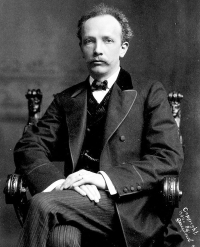
Richard Georg Strauss (German pronunciation: ; 11 June 1864 – 8 September 1949) was a German composer, conductor, pianist, and violinist. Considered a leading composer of the late Romantic and early modern eras, he has been described as a successor of Richard Wagner and Franz Liszt. Along with Gustav Mahler, he represents the late flowering of German Romanticism after Wagner, in which pioneering subtleties of orchestration are combined with an advanced harmonic style.
 Sheet Music Exchange is a web site for those who wants to access popular sheet music easily,
letting them download the sheet music for free for trial purposes.
It's completely free to download and try the listed sheet music, but you have to delete the files after 24 hours of trial period.
Don't forget, if you like the piece of music you have just learned playing,
treat the artist with respect, and go buy the original sheet music.
Sheet Music Exchange is a web site for those who wants to access popular sheet music easily,
letting them download the sheet music for free for trial purposes.
It's completely free to download and try the listed sheet music, but you have to delete the files after 24 hours of trial period.
Don't forget, if you like the piece of music you have just learned playing,
treat the artist with respect, and go buy the original sheet music.
